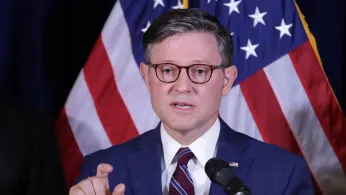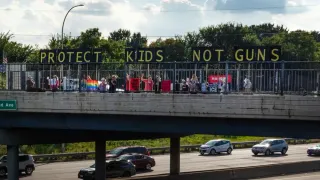
8 hours ago
Political Figures Face Backlash for Anti-Trans Rhetoric Following Minneapolis School Shooting
READ TIME: 3 MIN.
In the wake of a tragic shooting at a Minneapolis school, prominent U.S. politicians Mike Johnson, Speaker of the House, and Robert F. Kennedy Jr., independent presidential candidate, made statements that have been widely interpreted as demonizing transgender people. According to reporting by The Advocate, Johnson and Kennedy used their platforms to draw attention to the identity of the alleged shooter, despite evidence that the majority of mass shootings in the United States are committed by cisgender men, not transgender individuals .
Johnson, who has a history of opposing LGBTQ+ rights, and Kennedy, who has previously spoken out against gender-affirming healthcare for minors, both made remarks that LGBTQ+ advocates describe as scapegoating. Their comments came at a time when public discourse around transgender rights and safety is highly charged, with ongoing legislative attempts in various states to restrict gender-affirming care and other rights for transgender people .
Kennedy, in particular, has made claims about environmental factors supposedly affecting gender identity, including suggesting that exposure to the herbicide atrazine could cause gender dysphoria in humans. However, scientific experts and fact-checking organizations have found no evidence that atrazine exposure is linked to changes in human gender identity. PolitiFact investigated Kennedy’s statements, noting that his references to a study involving frogs do not translate to human biology, and no credible research supports the assertion that atrazine causes gender dysphoria in people .
Further, Kennedy has stated that transgender issues would not be a central focus of his campaign, yet he has consistently voiced opposition to gender-affirming care for minors, aligning himself with a segment of the political spectrum that seeks to limit access to healthcare for transgender youth .
LGBTQ+ advocacy groups quickly condemned the remarks by Johnson and Kennedy, arguing that such statements foster stigma and misinformation about transgender people. The repeated association of transgender identity with violence, despite a lack of supporting evidence, is viewed as especially dangerous at a time when transgender individuals already face heightened risks of discrimination, harassment, and violence. Organizations such as the Human Rights Campaign and GLAAD have previously documented the ways in which political rhetoric can contribute to hostile environments for LGBTQ+ people, including increased rates of bullying and mental health challenges among transgender youth .
Studies consistently indicate that transgender people are much more likely to be victims of violence rather than perpetrators, and that attempts to link transgender identity to criminality are not supported by crime statistics or research. The National Center for Transgender Equality has called for greater accountability from elected officials and urged the media to challenge unsubstantiated claims that promote fear and misunderstanding .
The controversy surrounding Johnson and Kennedy’s statements comes amid a broader national conversation about transgender rights, healthcare, and inclusion. In recent years, dozens of state legislatures have introduced or passed bills restricting access to gender-affirming care, participation in sports, and the ability for transgender people to update identification documents. The language used by high-profile politicians can influence public opinion and policy, making the accuracy and tone of their remarks especially consequential during an election cycle .
LGBTQ+ advocacy organizations are urging journalists, community leaders, and voters to scrutinize political statements and demand evidence-based policymaking. They emphasize that supporting transgender rights is not only a matter of civil liberties but also public health, as studies show that access to gender-affirming care improves mental health outcomes and reduces suicide risk among transgender youth .
Transgender people and allies have responded to the recent rhetoric by reaffirming the need for respectful, fact-based conversation about gender identity. Social media campaigns and advocacy events are highlighting stories of resilience and achievement within the transgender community, countering negative stereotypes perpetuated by political figures. Many local and national Pride organizations are stepping up outreach and education efforts, focusing on both the celebration of transgender identities and the urgent need to address misinformation .
Community leaders stress that every time transgender people are scapegoated for societal problems, it undermines efforts to build inclusive schools, workplaces, and neighborhoods. The demand for accountability—and for greater understanding of the lived experiences of transgender individuals—remains central to ongoing advocacy.
This episode highlights the importance of scrutinizing public statements by elected officials, especially when those remarks have the potential to influence policy and public attitudes toward marginalized groups. As the election season intensifies, LGBTQ+ networks and allies are urging the media and the public to prioritize the well-being and dignity of transgender people, and to challenge misleading narratives whenever they arise.






